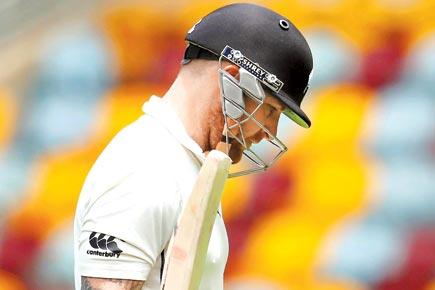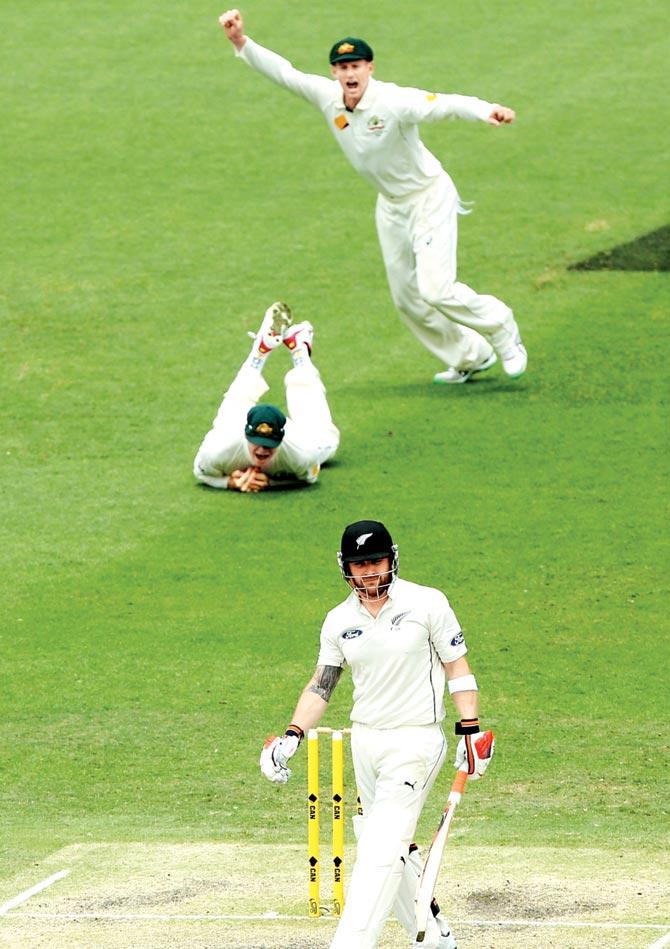The review system encourages cricketers to dispute the umpire's decision. That flouts what used to be the first tenet of a young cricketer's education: 'The umpire is always right, don't dispute his decision', writes former Aussie great

Brendon McCullum sulks as he heads to the dressing room. Pic/Getty Images
Sydney: From the outset India has distrusted the Decision Review System (DRS), in particular the ball tracking technology used for deciding leg before wicket appeals. It only took one decision in the recently completed Gabba Test between Australia and New Zealand to provide further proof India is right to have reservations about the system.
Australia's Steve Smith takes a catch to dismiss New Zealand skipper Brendon McCullum off Mitch Marsh during Day Five of the Brisbane Test November 9
When the DRS was upgraded to include ball-tracking, the ICC explained the intention was to reach the correct decision. In the second innings at the Gabba, Brendon McCullum was adjudged caught in the slips after the umpire concluded the ball had gone from bat onto pad and was then caught by the fieldsman.
ADVERTISEMENT
Unfair to McCullum
Replays showed this to be incorrect as the ball only hit the pad. The DRS, as it's presently constituted, actually conspired against McCullum receiving the correct verdict. That one decision encapsulated a lot of the controversy surrounding the DRS.
Firstly, any system that has a finite number of reviews can't guarantee the correct decision will be reached. New Zealand had used up both of their reviews and the re-calibration (after 80 overs) was still a few balls away when McCullum was given out. He had no recourse to justice and reluctantly, and in an agitated state, left the field.
Unfortunately for McCullum this situation was replicated at the WACA when New Zealand was again unable to correct a decision via DRS because they were out of referrals. Some believe McCullum only had himself to blame at the Gabba, as just a few balls before he'd encouraged partner BJ Watling to review his lbw decision.
Brendon McCullum sulks as he heads to the dressing room. Pic/Getty Images
That proved futile, as the umpires — who had a very good game — were once again proven to be correct. Therein lies another problem with the DRS; the players often use it as a tactic. Umpire's decisions shouldn't be part of a team's tactics; it's a ludicrous concept but that's what the DRS has spawned.
Worth the gamble
McCullum obviously believed it was worth the gamble on Watling's lbw as he was a central player in their bid to save the game. Just as obviously he didn't envisage needing another review before two more were re-allocated fifteen balls later when the 80 overs had been bowled.
This was a tactical gamble and it backfired. However, he would never have been in that position if the umpires were in sole charge of the DRS. If that was the case you'd expect only howlers to be overturned — the way DRS should work — and the fifty/fifty decisions wouldn't attract any scrutiny.
Fifty-fifty decisions don't cause problems on the cricket field. The players accept that one day they'll go in their favour and on another day they'll go against them; that's the way it should be. However, the really bad decisions that eventually cost one team dearly can cause friction between two sides.
Decision reviews being in the hands of the players highlights another flaw in the system; it encourages cricketers to dispute the umpire's decision. That flouts what used to be the first tenet of a young cricketer's education; "The umpire is always right, don't dispute his decision."
The administrators have legislated to undermine what was a very important aspect of a young cricketer's upbringing. Because there isn't universal acceptance of the DRS we also have the ludicrous situation where Tests are contested under a different set of laws, depending on where you are in the world and who is playing. This makes a mockery of fairness in Test cricket.
Then there's the question of who controls the DRS. The ICC should pay for the equipment (recoup the money in the sale of rights if they so desire), so each Test has a full complement of DRS technology.
At the moment, the system is dependent on what the host broadcaster can afford and consequently there's a discrepancy in the amount and standard of equipment used in different parts of the world.
The host broadcaster is also involved in the DRS process, when it should be controlled solely by cricket officials. Television companies are in the entertainment business and shouldn't be part of the decision making process.Until the DRS is subjected to a serious overhaul, India is right to be cynical. In this case India has used its power wisely.
 Subscribe today by clicking the link and stay updated with the latest news!" Click here!
Subscribe today by clicking the link and stay updated with the latest news!" Click here!







